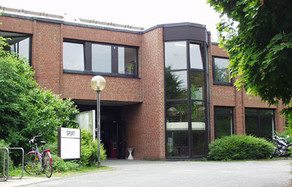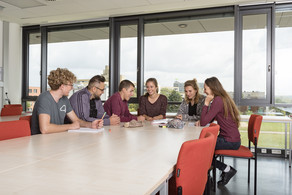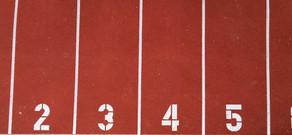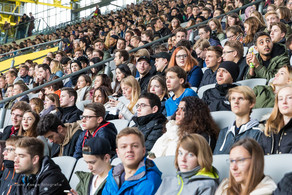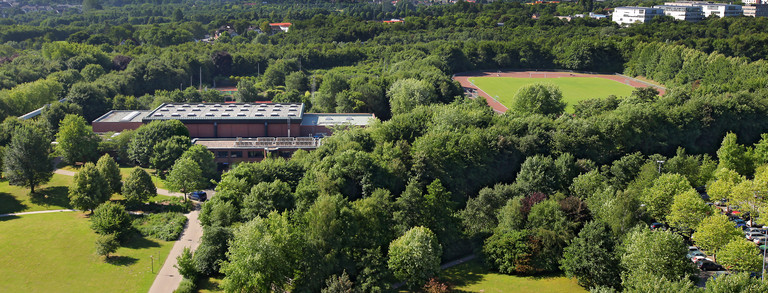Prof. Dr. Miriam Seyda
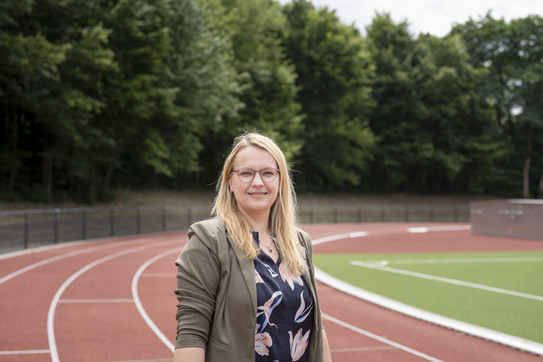
Head of Department 3: School and Teaching (Sport Didactics)
Acting head of Department 5: Development and Learning (Sport Psychology)
Room 1110
Otto-Hahn-Strasse 3
44227 Dortmund, Germany
Phone: +49 231 755 4108
Fax: +49 231 755 4105
Office hours during the non-lecture period:
Thursday, 8 Feb, 13:00 - 14:00
Thursday, 15 February, 13:00 - 14:00
Thursday, 7 March, 8:30 - 9:30
Thursday, 14 March, 8:30 - 9:30
In the summer term 2024:
11 April, 16:00 - 17:00
From 17.4 - including 24.07.24: Wednesday, 11:00 - 12:00
The consultation hours take place in presence.
Prior registration is not necessary.
In special cases, an individual consultation can be arranged via zoom.
Note on the courses in summer term 2024: My courses start in the second week of the semester due to examinations. If available, places will be allocated among those present at that time.
About the person
-
Head of Department 3: School and Teaching (Sport Didactics)
-
Acting head of Department 5: Development and Learning (Sport Psychology)
1997 - 2004: Study of German Language and Literature, Sport Science and Psychology at the Carl von Ossietzky University Oldenburg, Germany
2004: Graduation: Magistra Artium (Sport Science, German Studies)
2004 - 2006: Research assistant in the project ''Bewegte Sportwissenschaft''. Assistant in the project ''Bewegte Pause'' of the Central Institution for University Sports of the Carl von Ossietzky University Oldenburg
2004 - 2009: Research assistant at the Department of Sports and Sport Science at the TU Dortmund University (Third-party funded project: "Daily Sports Lesson at Elementary Schools in NRW")
2009 - 2013: Research assistant at the Department of Sports and Sport Science at the TU Dortmund University
2010: Doctorate (Dr. phil.) with the topic: Personality development through movement, play and sport. The importance of school sports for self-concept development in primary school age
2013 - 2018: Junior professor and head of the Department of Movement, Play and Sport in Childhood, Institute of Sport Science, WWU Münster.
2016: pos. interim evaluation
2017-2018: Substitute professor and head of the Department of Sport Pedagogy and Didactics, Department of Sport Science, European University Flensburg
2018-2022: University professor and head of the Department of Sport Pedagogy and Didactics, Department of Sport Science, European University Flensburg
since 03/2022: University professor and head of the Department School and Teaching
Hinternesch, S., Schwier, J., & Seyda, M. (2021). Digitalisierung meets Internationalisierung. Blended-Learning im Praxissemester. Zeitschrift für Studium und Lehre in der Sportwissenschaft, 4(1), 19-25.
Seyda, M., Egerer, M., Langer, A., & Hendricks, P. (2021). Gesundheitsförderung durch sportliche Angebote im Ganztag der Grundschule -- Ergebnisse eines dreijährigen Projekts. motorik, 44(3). 1-14.
Seyda, M. (2020). Sportlehrer*innenkompetenzen und Lehrer*innenprofessionalität. In E. Balz, C. Krieger, W. Miethling, & P. Wolters (Hrsg.), Empirie des Schulsports – Neuauflage (S. 218-243). Meyer & Meyer.
Seyda, M., Egerer, M., Hendricks, P., & Langer, A. (2020). „Kindergarten in Bewegung“ – Ein Projekt zur Steigerung von Bewegungs-, Spiel- und Sportmöglichkeiten im frühen Kindesalter. In J. Erhorn, J. Schwier, & B. Brandes (Hrsg.), Bewegung – Spielraum für Bildung (S. 181 – 196). transcript.
Thiele, J., & Seyda, M. (2020). Die Idee einer „Tägliche Sportstunde“ an Grundschulen. In E. Balz, & P. Neumann (Hrsg.), Grundschulsport: empirische Einblicke und pädagogische Empfehlungen (S. 323-334). Meyer & Meyer.
Seyda, M., & Langer, A. (2020). Die Orchestrierung des diagnostischen und didaktischen Handelns im Sportunterricht. Eine Frage der Kompetenz. sportunterricht, 69(8), 353-357
Seyda, M. (2018). Ausgeglichen und entspannt dank Sport? Schüler. Wissen für Lehrer. 18, 30-31.
Seyda, M. (2018). Können Sportlehrkräfte die Perspektive ihrer Schülerinnen und Schüler einnehmen? Eine Untersuchung über die Akkuratheit von Beurteilungen physischer Fähigkeitsselbstwahrnehmungen. Unterrichtswissenschaft, 46(2), 215-232.
Gebhard, B., & Seyda, M. (2017). Chronische Erkrankungen und Sportunterricht. In M. Giese & L. Weigelt (Hrsg.), Inklusiver Sport- und Bewegungsunterricht. Theorie und Praxis aus der Perspektive der Förderschwerpunkte (S. 279-314). Meyer & Meyer.
Burrmann, U., Seyda M., Konowalczyk, S., & Heim, R. (2016). Individualisierungstendenzen im Sport von Heranwachsenden - revisited. Sport und Gesellschaft, 13(2), 113-143
Heim, R., Konowalczyk, S., Grgic, M., Seyda, M., Burrmann, U., & Rauschenbach, T. (2016). Geht´s auch mit der Maus? Eine Methodenstudie zur Online-Befragung in der Jugendforschung. Zeitschrift für Erziehungswissenschaft, 19(4), 783-805. [IF : 0.485]
Seyda, M., & Thiele, J. (2016). Nachhaltigkeit in der Schulsportentwicklung? Eine exemplarische Analyse. Zeitschrift für Sportpädagogische Forschung, 1, 5-20.
Seyda, M. (2016). Potenziale einer Selbstkonzeptförderung von Heranwachsenden in und durch Schulsport. Bewegung & Sport, 70(1), 28-31.
Seyda, M. & Meier, H.E. (2015). Relations between social inequalities and effects of increased supply of physical education on children´s health – a longitudinal study on elementary schools. Journal of Physical Education and Health, 6, 5-14.
Seyda, M. (2015). Editorial. motorik, 38(1). 1-2.
Seyda. M. (2013). Ziele einer Selbstkonzeptförderung von Kindern durch Bewegung. motorik, 36(2), 72-79.
Seyda, M. (2013). Wirkungen einer „Täglichen Sportstunde“ auf die Entwicklung von Grundschulkindern. Bewegung & Sport, 67(1), 21 - 26.


